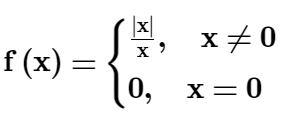If f is an even function, then prove that limx→0−f(x)=limx→0+f(x)
Step by step video & image solution for If f is an even function, then prove that lim_(x->0^-) f(x) = lim_(x->0^+) f(x) by Maths experts to help you in doubts & scoring excellent marks in Class 11 exams.
Updated on:21/07/2023Topper's Solved these Questions
Similar Questions
If f is an even function , then prove that Limx→0−f(x)=Limx→0+f(x) , whenever they exist .
View SolutionIf |f(x)|≤x2, then prove that limx→0f(x)x=0.
View SolutionIf f(x) is a thrice differentiable function such that limx→0f(4x)−3f(3x)+3f(2x)−f(x)x3=12 then the vlaue of f'''(0) equais to :
View SolutionIf f(x) is a thrice differentiable function such that limx→0f(4x)−3f(3x)+3f(2x)−f(x)x3=12 then the vlaue of f'(0) equais to :
View SolutionIf f(x)=sgn(x) and g(x)=x3,then prove that limx→0f(x).g(x) exists though limx→0f(x) does not exist.
View SolutionIf f is an even function such that (lim)h→0f(h)−f(0)h has some finite non-zero value, then prove that f(x) is not differentiable at x=0.
View SolutionIf f is an even function such that (lim)h→0f(h)−f(0)h has some finite non-zero value, then prove that f(x) is not differentiable at x=0.
View SolutionGiven (lim)x→0f(x)x2=2,where [.] denotes the greatest integer function, then (A) (lim)x→0[f(x)]=0 (B) (lim)x→0[f(x)]=1 (C)(lim)x→0[f(x)x] does not exist (D)(lim)x→0[f(x)x] exists
View SolutionEvaluate limx→0f(x), where

View SolutionGiven a real-valued function f such that f(x)=⎧⎪ ⎪⎨⎪ ⎪⎩tan2{x}(x2−[x]2)√{x}cot{x},forx<0,fx>0 Where [x] is the integral part and {x} is the fractional part of x, then (lim)x→0+f(x)=1 , (lim)x→0−f(x)=cot1, cot−1((lim)x→0−f(x))2=1, tan−1((lim)x→0+f(x))=π4
View Solution
